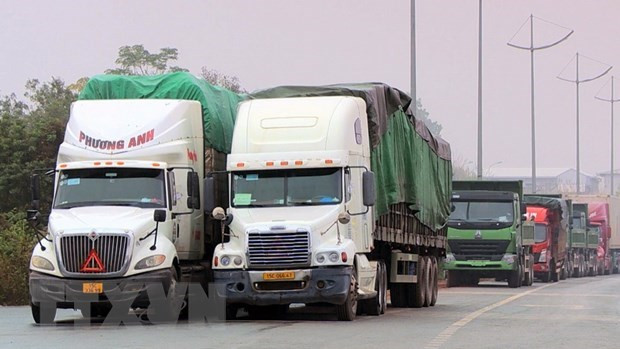
Meanwhile, the province's import value was estimated to reach 1.43 billion USD in the first six months this year.
The growth was attributed to the province's efforts to maintain the opening of its border gates with China, preventing disruptions to export and import activities amidst the complex developments of the COVID-19 pandemic.
The province has established a number of “green” zones inside the border gates where strict virus control rules are applied. In these zones, entry to which is restricted to prevent infections, goods are delivered through customs agents and handled by a designated team of drivers and porters.
Quang Ninh has provided regular updates and recommendations for other cities and provinces as well as traders on the status of cross-border trade of agricultural, forestry and aquatic products with China through its checkpoints.
It has actively developed plans to protect the green zones and make sure they are free from COVID-19 and comply with virus control policies of both Vietnam and China.
Additionally, its leaders have discussed with their Chinese counterparts in Dongxing on pandemic preventive measures on a regular basis to strengthen trust between the two sides and jointly work to resume customs clearance at the border gates shut down because of COVID-19.
Authorities of Mong Cai, a city of Quang Ninh which has multiple border checkpoints with China, require all customs officers, porters, drivers, customs agents and others who work at the checkpoints to present negative RT-PCR test results issued within 48 hours or take self-paid rapid tests at the entrance.
They must also be vaccinated against COVID-19 with at least two primary doses and stay inside the green zones in isolation with outsiders for a minimum duration of 15 days.
Thanks to such efforts, checkpoints Km3 4 Hai Yen, Bac Luan and Ka Long of Mong Cai have been reopened. Customs clearance there have been restored, easing the long queues of trucks around border areas.
China has remained Vietnam’s largest importer of agricultural, forestry and aquatic products for years. The neighbouring country has been pursuing a “dynamic Zero-COVID” policy with stricter rules and higher standards on imports.
In the long run, Vietnam has been urged to come up with more solutions that are aligned with China’s new policies to boost agricultural product exports to the neighbouring country this year and beyond.
It must also accelerate progress of negotiations on expanding the list of items entitled to official quota exports and restructure its agriculture sector to develop more farming areas of premium products meeting export standards.
Source: VNA